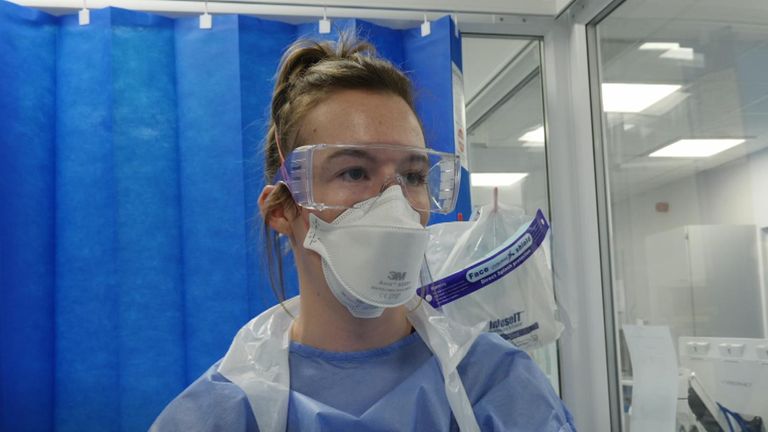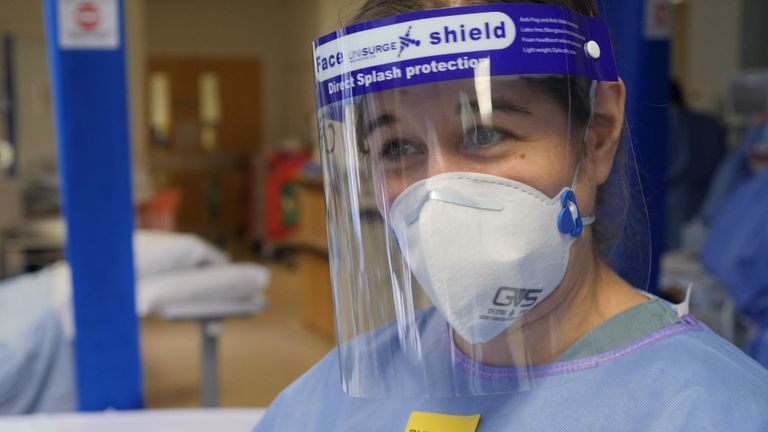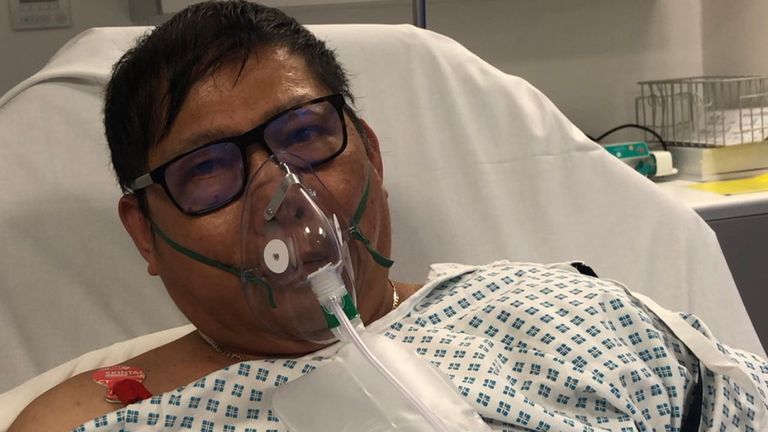Hope and agony on the COVID wards.
It’s around 4 o’clock when seven ambulances arrive all at once.
COVID-19 hospital admissions may have dipped slightly this week, but glimpse into Barnet Hospital’s emergency department for a reality check.
You will see we are still in the thick of a crisis.
Domestic cleaner Larisa Atanasova, renowned in the hospital for her machine-like efficiency, can barely wipe down the bays quickly enough.
She wipes and wipes and wipes; beds, rails, sinks and taps.
“They come every two minutes,” she explains, before adding: “What can you do? The next patient is coming.”
She’s right, two minutes after she’s disappeared into another room Davian Hunt arrives.
He is 52, in good physical shape, but he can barely walk.
“Just total lack of energy,” he says, lying on the bed. “I just want to sleep all the time.”
Across the department behind a glass wall a man, struggling to breathe, is about to be given CPAP – a mouthpiece that rapidly blasts in oxygenated air.
The 63-year-old postal worker, Felix Ramat, lost his wife four days earlier to COVID-19 – now he is dangerously ill.
What’s more, his 40-year-old son-in-law is already upstairs in the hospital on a ventilator.
This virus rips through families and it has also spread through the A&E department.
The two nurses treating Mr Ramat have themselves just recovered from the illness and now they are back in the fray.
Nurse Aoibheann McCarthy says: “It’s been intense. I’m personally just back from having COVD-19. So, it’s been a hard struggle. I’m weak. I’m tired. But I’m back here. We’re busy. We’re full every day. We’re struggling, but we’re getting through it. We have good support here. About seven of us went off at the same week.”
Upstairs in the COVID-19 intensive care wards recovery is uncertain, but all the same, unconscious patients are being prepared for it.
Respiratory physiotherapist Clare Bendall is doing what’s called ranging – pushing limbs back and forth, making sure the patient’s joints don’t stiffen up so movement will come back more easily.
She talks the patient through each movement as they lie unresponsive on the bed.
“We’re now going to lift this left arm up. We’re going to touch your chin. And straight. Lovely,” she tells the man attached to a ventilator.
She says: “Sometimes you hear from our previous survivors… they say they remember like hearing accents rather than actual words.” She looks at her patient and adds: “But you know, I just think he’s a person, and I’m going to tell him what I’m doing.”
She then says to the man: “Now, going to give this knee a bit of a stretch. Going to pull this knee to your tummy. So, we’re going to bend that up. Lovely. Can’t let these knees and hips get stiff.”
It’s sometimes easy to forget that the people doing this kind of work are day-in-day-out absorbing the horror of what’s happening in the room.
“I think this sounds silly but the worst thing is when we do our ward books in the morning,” says Clare. “It’s when the amount of RIPs outnumber the ones that have made it down to the wards. And I think that’s when it really kicks in.”
The emotion starts to rise up behind her visored eyes.
“And they’re a lot younger – in the first wave, sorry, I remember thinking that could be mum. That could be my aunt. And now I’m thinking that could be me. That could be my brother, my boyfriend.
“We’ve lost people in their 30s, in their 40s. It’s heart-breaking.”
Having told me this, she barely pauses before collecting herself and getting straight back to work.
No wonder a study last month by King’s College London found nearly half intensive care staff surveyed over the summer reported symptoms of post-traumatic stress disorder, depression or anxiety.
Universally, medics say that specialist intensive care nurses are under the most pressure, people like Harriet Goudie working at an adapted outpatients’ ward on the second floor of Barnet’s sister hospital, the Royal Free in north London.
Harriet says: “Honestly, it’s been really, really bad for the ITU nurses. I think, this wave especially, it was really bad. The first wave, it was so stressful. And I think the amount of pressure that the ITU nurses are under now is incredible.”
Harriet has been tending to four patients when normally she would offer one-to-one care.
She said: “These are really sick patients. So there is multiple organ support and for the ITU nurses that’s just extremely difficult to try to manage.
“This is an outpatient ward that we’ve had to turn into an ITU ward. So it’s really difficult, as you can see in these bed spaces, to try and fit all the IT equipment in. We’re trying to cram it into small spaces. We’re just running out of things like plugs, for example. We don’t physically have enough plug sockets in some areas to be able to charge all of our equipment.”
As we are on the ward together, a family is speaking on a video call to a barely conscious patient, telling him they love him, telling him he can get better.
They have his glasses for him just as soon as he can sit up and read, and they miss him and can’t wait for him to get better and come home.
“He can hear us,” one of them says. “His eyes are opening.”
This is the first time it’s happened.
Out of sight from their video screen he is also trying to raise a hand, but it slumps back.
He lies still. But he is listening.
And as they talk the curtains are drawn and porters arrive.
A man in his early 60s in the bed opposite has died, he is being taken to the mortuary.
A body in a white bag is placed into a blue bag on a trolley and wheeled out.
It is a scene made more brutal by the tender voices and the sheer strength from the family, chatting to an unresponsive man, in the booth next door.
But they are right to have hope because patients do come back.
Upstairs in another intensive care unit 53-year-old Dima Hooper is sitting up in her chair.
She’s an NHS caterer for patients on wards.
The week before, I’d seen her in a similar state to the man listening to the video call.
Now, though, she has a tube in her neck and is smiling.
She gives me and my cameraman the thumbs up and indicates that in two days’ time she expects to be able to talk.
:: Listen to the Daily podcast on Apple Podcasts, Google Podcasts, Spotify, Spreaker
Just down the corridor Nicolae Ursachi, who spent 40 days on a ventilator, is standing up with the assistance of a walking machine and three members of staff.
He is breathless within four steps and has to sit down. He is also fiercely determined, and after some rest he wants more.
Therapy assistant Chloe Davis says: “It’s like a marathon, that you have to train for. That’s what we explain it to the patients as. It’s a marathon, not a sprint.”
The same could be said for the work being done by medics – like Nicolae their progress is slow and exhausting but driven by hope.
Over three nights, Sky News will host a series of special programmes examining the UK’s response to the pandemic.
Watch COVID Crisis: Learning the Lessons at 8pm on 9, 10 and 11 February.




